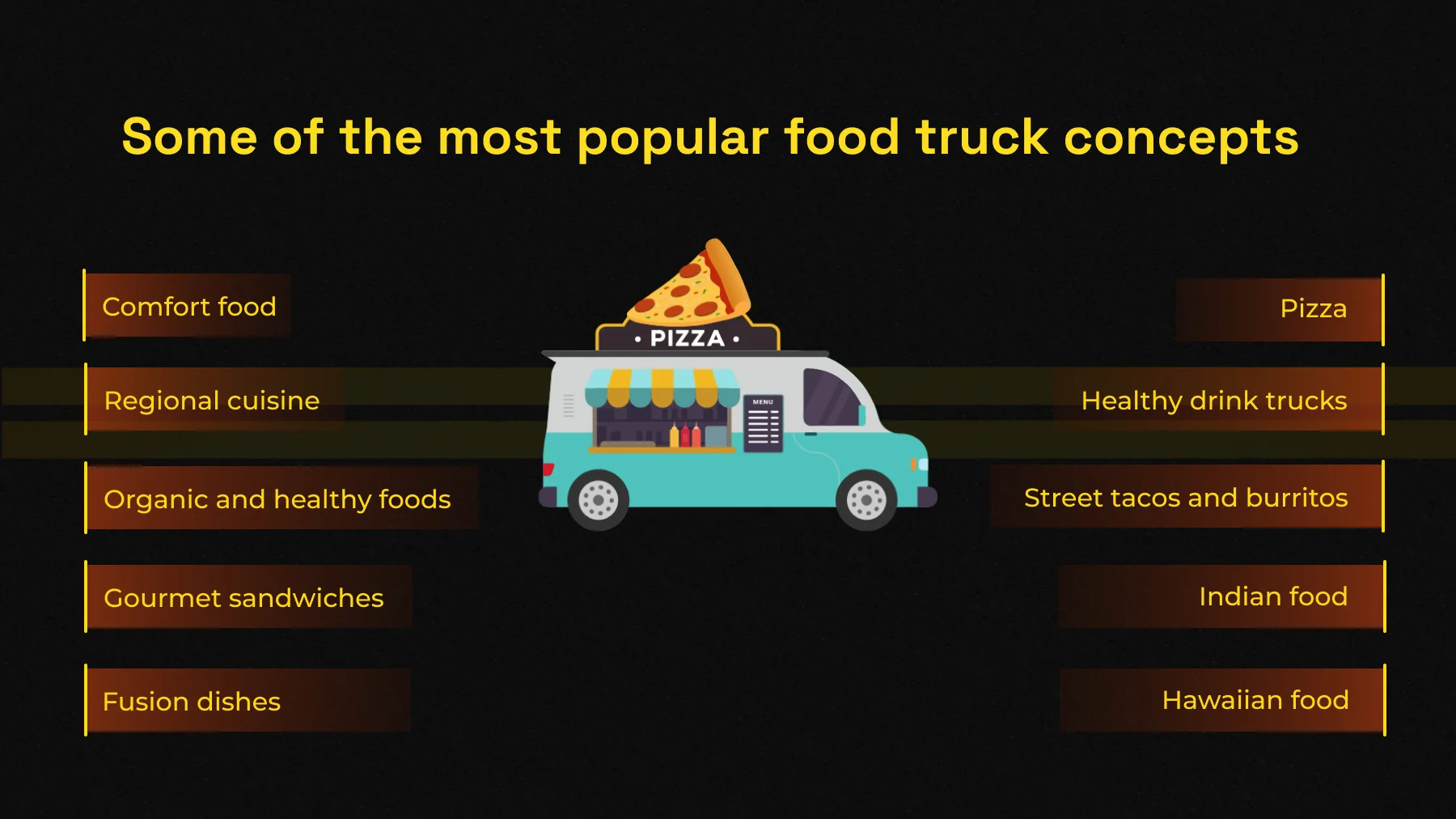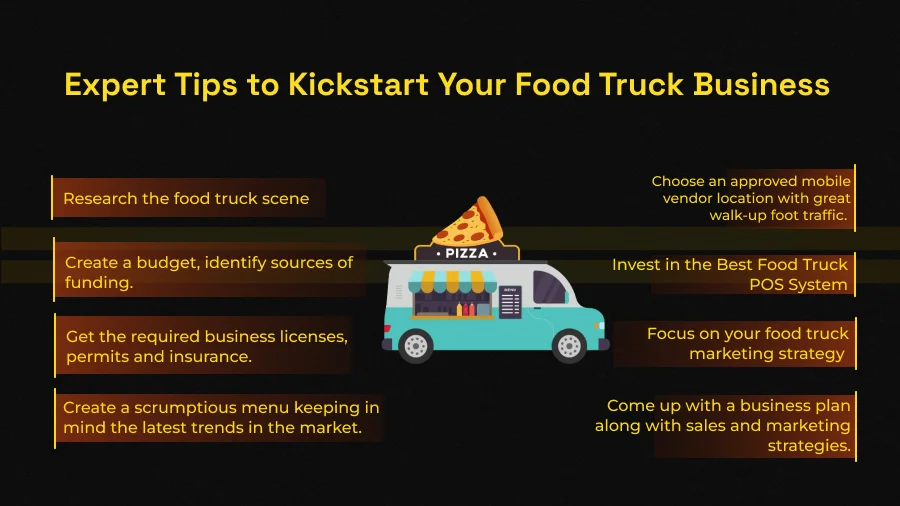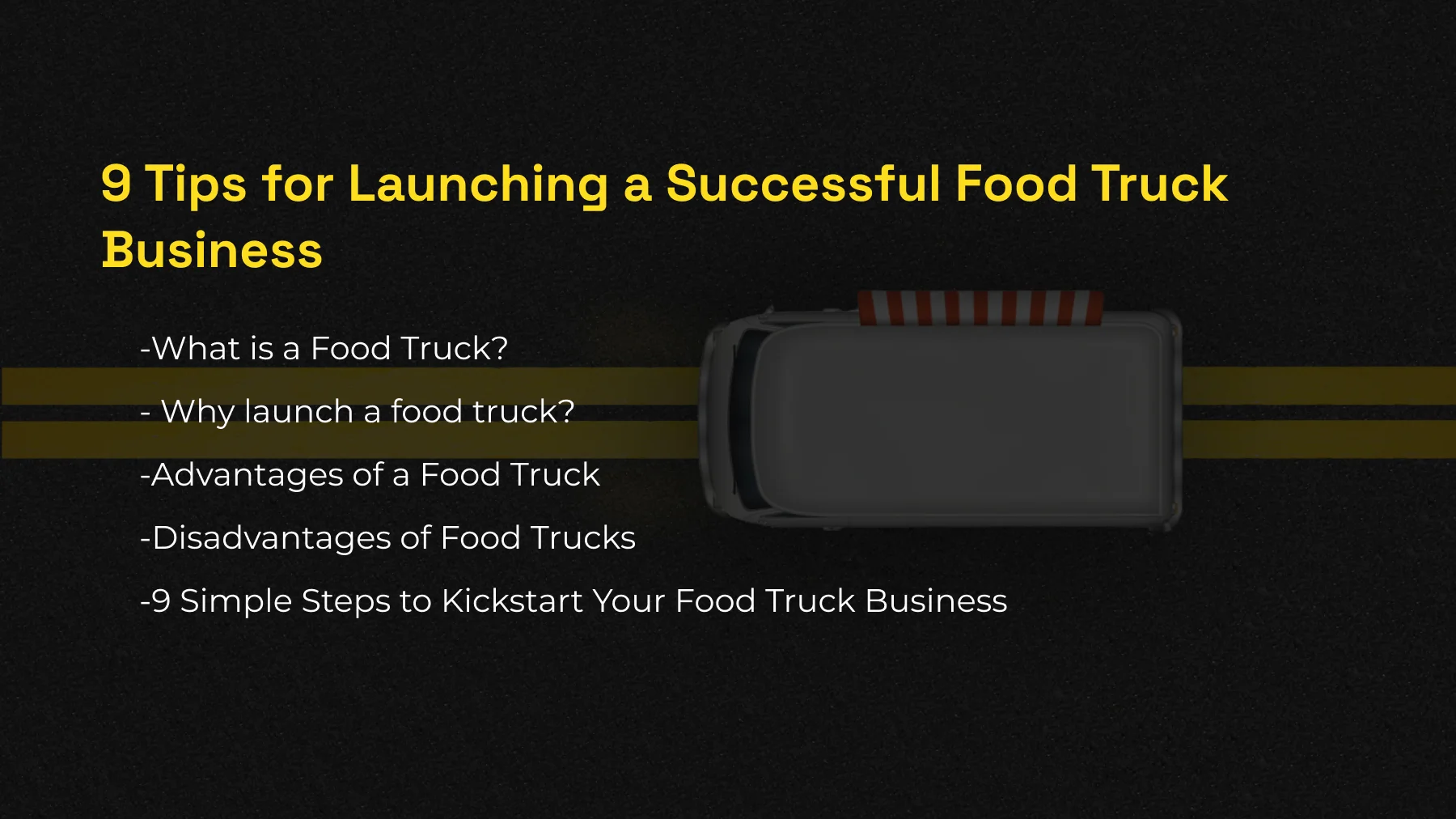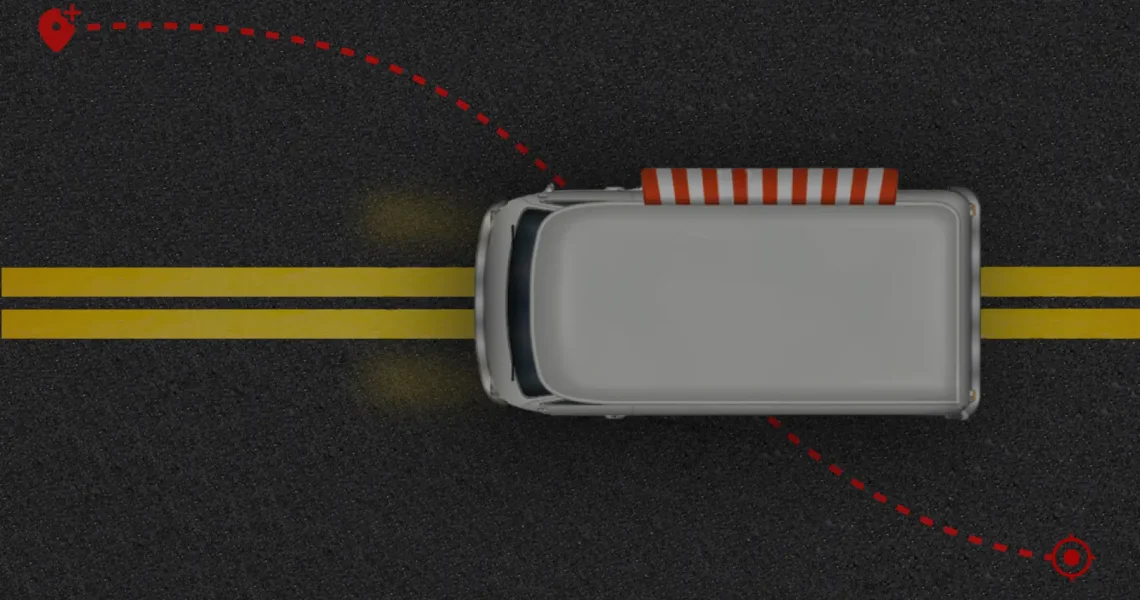9 Must-Know Tips for Launching a Successful Food Truck Business
More than 80% of American families eat fast food at least once every week. This is one of the reasons why the food truck sector is thriving like never before. Whether it's tacos, sourdough pizza, or plant-based burgers, modern entrepreneurs are bringing street delicacies and experimental cuisines from all over the world to our doorstep.
That may sound like a brilliant business idea, especially given that 36.6 percent of American adults eat fast food every day, indicating a clear market.
Food trucks have constantly earned a spot in the restaurant industry as a viable business concept.
For many people, owning a food truck is the key to achieving financial independence – maybe you want a piece of that cake!
Would you like to start a food truck? Don't know where to start?
Don't worry, we're here to help you learn everything you need to know about starting a food truck business.
Food trucks are vehicles or movable space units designed to operate a mobile business.
It does not have to be a restaurant, as the idea may be applied to a variety of companies, including coffee shops, ice cream shops, pastry shops, and others.
Depending on the sort of business, the unit must be outfitted with all it needs to function properly. You'll also need air conditioning and good lighting.
This truck must perform various roles for any food business, including storing ingredients, preparing them, cooking them, and providing excellent customer service.
Why Launch a Food Truck?
As with all good things, starting with the why will help you develop the drive you'll need when the task becomes work. Reasons to launch a food truck business include:
You are the boss
It's difficult to dispute when the buck stops with you. Instead of working for the man, you become the man — or woman, or whoever you want to be. Being the boss grants you freedom, independence, and power. Of course, all of this entails responsibility.
It’s fun
Food trucks, perhaps more than any other business, incorporate a sense of humor and quirkiness into their operations. Eating at a food truck is just enjoyable both for the employees and the customers. People enjoy cooks that serve unique cuisine, especially if the name is a pun!
It is a wise investment
By bringing a food truck, you are contributing significantly to the party. But it's a serious business, too. With no more than five employees, these tiny businesses may continue to feed the community even when health restrictions prevent indoor dining. They can follow the market and shift more easily when obstacles arise.

Advantages of a Food Truck
- Food trucks offer significant benefits over restaurants, making them an extremely feasible business concept.
- First and foremost, the initial expense is cheaper. Starting a very tiny restaurant requires a budget of at least $30,000 USD.
- A food truck can cost 20% to 50% less, depending on the type, equipment, size, and other factors. We'll go into detail about some specific charges later.
- Another advantage is that running costs are typically lower. You can sell basic dishes that don't use expensive ingredients and don't take much preparation or labor.
- Payroll is also reduced because a food truck can operate effectively with three or four persons depending on its size and service offerings.
- Rent is also not required, and if you must pay it in a food truck park, it is significantly lower than renting a commercial location.
- Finally, because it is a mobile business, you can take it wherever you want to test the flow of people, as well as take advantage of any festivals or events to sell more.
Despite this, there are a few drawbacks to consider.
Disadvantages of Food Trucks
- Food trucks have maintenance costs that are directly related to vehicle operation — while this is not an issue if the vehicle has a trailer.
- If the vehicle frequently fails, this expense can be too expensive. You should also factor in the cost of petrol into your operational expenses, especially if you frequently go across town.
- A further challenge is that operating a food truck is not technically permitted in some countries, or that the rules have not been updated to reflect this relatively new business model.
- Obtaining operating permission might also be difficult. If you believe that having a food truck would provide you with more free time than operating a restaurant, think again! Being your own boss takes time, regardless of business.
- A significant disadvantage is that they are heavily influenced by weather, particularly cold weather.
- Cold temperatures have a significant impact on sales since there are fewer customers, and they can also damage the operation of equipment and workers if the business is not properly insulated.
9 Simple Steps to Kickstart Your Food Truck Business
The key to a successful food truck is to put in the work before the first order is placed. Follow these key measures to have a successful entrepreneurial experience.

1. Research the food truck scene
Before committing to launching a food truck, make sure your concept will stand out in the current market. Begin by researching your city for:
- Existing Food Truck Businesses and Concepts
- Existing Restaurant Concepts
- The average demographic of the population.
- The area where food trucks can stop and sell their products.
- Busy street hours during which commuters can become customers
- Check to see whether there is a demand in your city for the food truck concept you'd like to promote.
2. Select a Food Truck Concept
You'll want to cater to the interests of your city's residents with your food truck, but you'll also want to convey your own hobbies and passions through your business. After conducting preliminary research, select a food truck concept that combines your unique flair with the community's problems. From there, you can choose a name and logo that accurately reflects the essence of the business you run. Your concept, name, and logo should have the following attributes:
- Be unique and unforgettable.
- Be descriptive and attention-getting.
- Clearly express your intentions without being overly explicit, allowing for growth.
- A well-thought-out concept and visually appealing logo can have a significant impact on customers' decision to shop from your truck.
3. What licenses and permits are required to start a food truck business?
The licenses and permits required to start a food truck business differ by state. Regardless of the state you live in, you will require at least three sorts of licenses and permits: general business licenses, food service licenses, and vehicle licenses.
(I) General commercial licenses
1) Wholesale license: A wholesale license, also known as a reseller's license, permits you to purchase goods or items in bulk from your suppliers at a discount and resell them without paying taxes.
2) State sales tax permit : This license allows you to report your firm to the state sales tax authorities. Any sales from your food truck are subject to state and local sales taxes, and you must register with your state in order to accurately record your sales tax payments.
3) Employer Identification Numbers (EIN): The EIN is a number assigned by the IRS to identify your firm for tax purposes. When you hire staff, register with your firm, or seek a loan from a bank or other financial institution, you will need to provide your EIN.
4) Doing Business As (DBA) Registration: If you run your food truck as a sole proprietorship or want to use a different business structure than the LLC you established with the state, you will need a DBA to register the fictitious name.
(II) Foodservice licenses
In most cases, the state or county health agency issues food service licenses. You will need separate licenses for your truck, kitchen, yourself, and, in some cases, personal workers. Food service permits and licenses typically require you to take a food safety test or have your facility pass a food safety inspection.
(III) Vehicle Licenses
You must travel to the Department of Motor Vehicles to obtain commercial license plates for your truck. If your vehicle exceeds particular length and weight restrictions, some jurisdictions require you to obtain a commercial driver's license (CDL). However, some states prohibit the use of CDL vehicles as food trucks.
You may also require a parking permit for your truck. A food truck, unlike a standard vehicle, cannot be parked anywhere. Parking laws vary from town to town. Additionally, neighborhood associations and local health officials may compel you to follow their own guidelines.
- Use this checklist to avoid any difficulties.
- Check with your county clerk for a list of parking restrictions or permit requirements.
- For details on lesser-known parking restrictions, contact your local motor vehicle department.
- Include overnight parking in your commercial kitchen contract.
4. Create a budget
The initial budget for opening a food truck varies substantially depending on a number of factors. Here are some of the questions you need to answer to calculate it:
- Will you start your own food truck from scratch?
- Will you purchase a prefab food truck?
- What kind of food truck do you have in mind?
- What kind of food will you be selling?
- How much should you spend on kitchen equipment based on your gourmet offering?
- How much money do you need to invest to start inventory?
- How much should you spend on legal advice and permits?
- What amount should you pay your employees?
- What amount of rent will you pay?
You should also save some money to maintain your business as it grows in popularity, invest a portion of your budget to develop and implement a marketing strategy, and follow other guidelines outlined in the article about opening a restaurant.
5. Buy a food truck
Given that your food truck vehicle will consume the majority of your startup budget, you must choose one that will best fulfill your needs. When selecting the vehicle that will become your food truck, you should examine the following factors:
- Deciding whether to lease or own your truck
- Deciding whether to purchase a new or used vehicle
- Choosing a reliable food truck dealer
- Choosing what customizations, you need for your vehicle
Furthermore, it is important to get insurance for your truck and business to cover any physical damage or liabilities that may arise. Once you've purchased a food truck, you may need to complete your inspections and permissions before you can legally operate on the street.
For more information on the cost of starting a food truck, please see our comprehensive guide.
6. Purchase Your Food Truck Equipment and Supplies
Food truck operators are working on food truck equipment.
Once you've purchased a truck, the following step is to outfit your area with food truck equipment and supplies. These things will be required for both product production and keeping your truck operating efficiently.
To stock your food truck, you'll need:
- Cooking Equipment: Grills, ranges, fryers, microwaves, toasters.
- Warming and holding equipment includes countertop food warmers, soup kettles, and fry dump stations.
- Food preparation equipment includes worktables, chef knives, cutting boards, cookware, kitchen utensils, kitchen thermometers, and serving and portion spoons.
- Serving equipment includes disposable take-out items, meal platters, napkins, cups, and plastic cutlery.
- Refrigeration Equipment: Prep tables, undercounter refrigeration, and ice machines.
- Janitorial equipment includes hand sinks, compartment sinks, floor mats, sanitizing chemicals, garbage cans, recycling bins, and floor care products.
7. Invest in the Best Food Truck POS System
According to recent research, 80 percent of consumers have used contactless payment methods in the last year, while up to 70 percent of millennials use smartphone payments. Accepting card and digital payments is easiest with a cloud-based mobile POS system.
A POS system, however, is more than just a payment method. A good food truck POS system will monitor your supply levels, inform you when inventory is low, assist you with inventory counting, and keep track of all cash transactions. Modern POS systems now include facilities for storing consumer contact information for targeted marketing efforts, managing social media profiles, and keeping track of online reviews.
8. Focus on your food truck marketing strategy
If a food truck rolls up to a lot and no one is present to eat, did it even arrive? Don't respond; instead, concentrate on avoiding that situation. Starting a food truck business hinge on effective marketing. Make the following duties a part of your outreach initiatives.
Launch your website!
Just because your restaurant's physical presence is mobile does not imply that its online presence should be nonexistent. Before trying a food truck or restaurant, many people do their research online.
- Your restaurant website does not have to be sophisticated, but it should include:
- A homepage with pictures of your food truck so customers know what to look for.
- A menu that includes photographs of the most popular or distinctive foods.
- A calendar that shows where patrons can find you on what days.
- Contact information, with links to social media platforms.
Start email marketing
One of the most effective strategies to build a devoted following when beginning a food truck business is to use email marketing. In addition to flinging delicious takeaway meals from your window, you should prioritize email address collection. In exchange for contact information, consider holding a raffle for a gift card or giving away any merchandise you have.
Direct emails can be used as special invitations for people who already enjoy your food. You can let them know where you'll be and highlight your promotions to grab their interest. Don't forget to encourage them to bring their friends and relatives.
Stay engaged on social media
Social media is also an effective strategy to keep your food truck business top-of-mind all year. Take photos of folks enjoying your offerings and tag them on Facebook or Instagram. Instead of spreading yourself too thin on social media, focus on one or two networks. It's also crucial to post on a regular basis, so make time for it.
Remember to keep on brand while cultivating new customers. Consider your target demographic and ensure that everything you share will resonate with the consumers you care about the most. Be careful and consistent so that people understand what they can expect from you in terms of messaging and cuisine.
9. Keep the calendar full
After completing the previous steps, you will be ready to drive to your first event. Keep your calendar full by calling various towns and civic organizations to find out where hungry people will be. Consider farmers' markets, family events, and other outdoor gatherings. Let folks know you are available for private gatherings.
When it comes to how to establish a food truck, there is a lot to think about and do, so start with choosing a name. Then you can get a domain name for your website and claim the social media sites. Soon, your food truck business dream will become a reality.
KEY TAKEAWAY!

